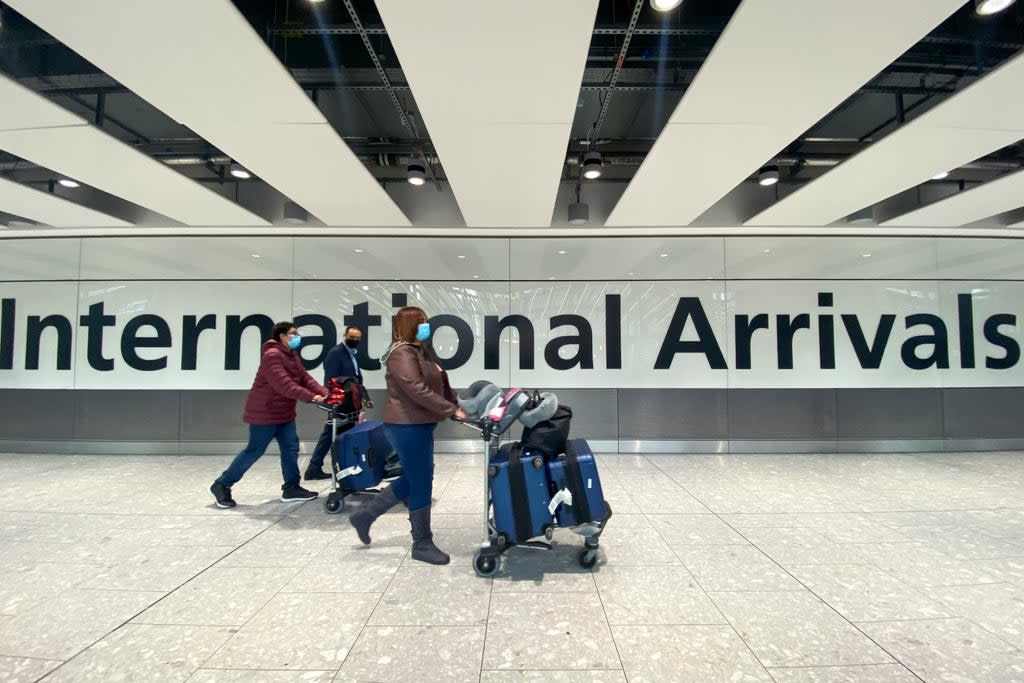Omicron: Travel fury as government fails to say when new rules on PCR tests and self-isolation begin

Plans to reintroduce compulsory PCR tests and self-isolation for all UK arrivals have been described as a “huge blow” for the travel industry — and a headache for thousands of passengers who have yet to be told when the new rules take effect.
The move, announced by Boris Johnson on Saturday, has been welcomed by scientists as a way of buying time to learn more about the Omicron variant.
But Abta said the added cost of testing for all arrivals to the UK will have an impact on customer demand for holidays, adding pressure to an industry which has been among the "hardest hit" during the pandemic.
And thousands of Britons with flights arriving in the coming days have been left in the dark over what costs and restrictions they will face when they land.
PCR tests are needed to identify and monitor the new Omicron variant, which cheaper lateral flow or antigen tests cannot track.
The NHS provides free PCR tests for patients and some key workers but travellers must pay for private sector PCR tests if needed for overseas trips. UK arrival forms require evidence of a pre-booked paid-for test.
It means thousands due to arrive in the UK this week may have to abandon their prepaid lateral flow tests and buy new PCR ones instead, as well as isolating at home.
Paul Charles, chief executive of the PC Agency travel consultancy, said: “It’s a sign of how little the UK government understands global travel that they announce all arrivals have to take PCR tests and self-isolate – but don’t say from when.
“Travellers are getting on planes now. Every second of every minute."
There are now 10 countries on the Government red list for travel, which means arrivals from South Africa, Botswana, Eswatini, Lesotho, Namibia, Zimbabwe, Angola, Malawi, Mozambique and Zambia will have to quarantine for 10 days.
But travellers from all countries will have to self-isolate until they get a negative PCR test result.
"While Abta understands that this is a rapidly evolving situation and public health must come first, the decision to require all arrivals to take a PCR test and self-isolate until a negative result is returned is a huge blow for travel businesses, many of whom were only just starting to get back on their feet after 20 months of severe restrictions," an Abta spokesman said.
"These changes will add cost to people’s holidays, which will undoubtedly impact consumer demand and hold back the industry’s recovery, so it’s vital that this decision is kept under careful review and restrictions are lifted promptly if it becomes clear there is not a risk to the UK vaccination programme.
"The Government must also now consider offering tailored support for travel businesses, which have been amongst the hardest hit during the pandemic."
Scientists believe increased testing will give time to better understand the risk Omicron might pose before the variant becomes more widespread in the UK.
Dr Nathalie MacDermott, National Institute for Health Research (NIHR) academic clinical lecturer at King’s College London, said: "The action to ban flights from the most affected countries is never a decision that should be taken lightly.
"But for a brief period it can buy the time needed to better understand the threat posed by this new variant and ensure the implementation of more robust identification and targeted contact tracing for individuals arriving from those countries now placed on the red list.
"The decision by the Government to re-implement the need for a PCR test from all individuals arriving in the UK from abroad on day two, with self-isolation until a negative test is reported, while frustrating for those travelling, is essential in order to rapidly identify cases of infection with the Omicron variant and implement prompt isolation and targeted contact tracing to limit the spread of the variant in the UK."
Concerns have also been voiced about whether the testing industry can meet a sudden rise in testing demand.
Which? travel editor Rory Boland said travellers will understand the need for restrictions, but the private testing industry which they will have to rely on "isn’t fit for purpose".
"Testing firms have struggled to provide tests on time over the past year, so it is hard to have confidence they will be able to cope with this spike in demand at short notice," he said.
"Now that the Government has taken the decision to make PCR tests mandatory, it must take steps to properly regulate the marketplace and implement the CMA’s (Competition and Markets Authority) recommendations so that consumers can have confidence they are booking with a provider they can rely on."
Read More
What are the new travel changes and how will rules work?
Travel industry relief mixed with fury after government eases rules
Which countries are on the green list?
Fears over Covid variant trigger more travel curbs on southern Africa
Biden announces travel restrictions on eight countries in response to Omicron variant
Fauci says US may block travel again if new Covid variant evades vaccine


